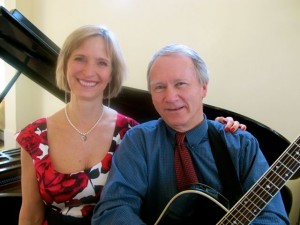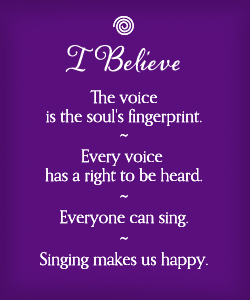Yesterday, I performed a Valentine’s Day concert of love songs called “Recession Proof Valentines: I Can’t Give you Anything But Love” with Kent Allyn, my long-time accompanist and musical pal. We give an annual concert every February in honor of love. The hall was full of old friends who come every year and some new faces, too. Kent and I had a great time playing these songs.
Afterwards, we got talking about how nervous we each get before this concert. This is the one concert that makes me the most nervous. I always thought Kent was cool and unflappable, but turns out the older he gets the more nervous he gets. We started comparing notes about how to manage this performance anxiety.
Performance anxiety or stage fright is a consuming experience, affecting my body, mind, and spirit. It impairs my energy, my ability to focus, memorize, breathe, and stay calm. In fact, the fear of how the anxiety will affect me is often worse than what actually happens.
About two days before this concert, I decided to focus all of my preparation on channeling my anxiety into a positive state of readiness. I have developed many strategies for handling my performance anxiety over the years. It was reassuring to experience again that these strategies work for me. Here are my top 3 strategies.
1- I reframe every negative, anxious, worried thought into something positive and present tense. I write out as many as I can think of and read them first thing in the morning, before bed, before or during practice, and whenever my worried brain gets overwhelmed, for example- “I’ll never remember all these words” becomes ” I trust my memory. I know how to prepare.”
2- I make a list of what I am most worried about and focus my practice on those things. The older I get, the more focused practice time I need. In this annual Valentine’s concert, memorizing words is one of my biggest worries. I write the words for each song on a 4×6 index card. I carry them with me all day, taking them out to review at red lights, in lines, waiting for an appointment, on my daily walks. The time over-preparing reassures me.
3- Meditation – I have found that being still and centering myself reminds me that there is a place in which worries are irrelevant. The more anxious I am, the more I meditate. In that quiet place, I sing the songs in my mind as if I am singing them for sheer joy, no goals, no outcomes. It is blissful and makes me happy. I can breathe. The more practice I have singing in that place, the better able I am to sing in performance with total presence and joy.
Very happily, that is how the concert went yesterday. It was a joyful sharing of songs with friends, songs that we both loved preparing and performing. It was a performance, but I felt present to each song, each note, each beautiful turn of Kent’s piano phrasing. The songs then become a place in which everyone in the room can connect, sharing an experience of the pleasure, ache and tingle of love.
I am interested in how you manage performance anxiety. Feel free to share your strategies on this blog.


Glad that all went well for you and Kent! I agree that the mental work is as important as time marches on, if not more so, than practice and rehearsal. I remind myself that I am a singer, doing what I have done all my life and love to do, that others appreciate hearing me, and that many folks who can’t or don’t sing would love to be able to. When I was teaching/training more, I often thought, “Just remember, whatever happens, they are hear to learn from you and you have skills to impart.”
Pam, Thank you for posting on my blog and for your great comments.
I agree totally. Everyone has their moments of self-doubt and anxiety.
When I am performing I think about the fact that I am
sharing my voice and my feelings about the music with the audience.
We learn from everyone.
For all the world-class vocal talent and adoration that Whitney Houston obviously had, I heard that she in fact was affected by the awful thought of going onstage and delivering a disappointing concert performance and then having to bear the hurtful criticisms from all the critics. How is this possible? It might seem like needless self-induced pressure to be technically pitch perfect on every note and live up to very high standards and expectations for every concert. Or was onstage failure just an out of control manic fantasy still living within her fragile childhood psyche. Or maybe she fully grasped the reality of what drug abuse does to the quality of a 2-hr live performance and unfortunately she would never know if a particular night was going to be one of her “bad” nights. Too bad we’ll never know now what it was.
Carly Simon also has stage fright and rarely ever performs live. live.http://www.nytimes.com/2005/11/24/arts/music/24carl.html?ref=carlysimon
Then there’s Barbra Streisand who also has it. http://entertainment.oneindia.in/music/international/2010/barbra-streisand-battle-stage-fright-181110.html
However, I’m sure there are singers who have arrived in their own mental comfort zone where stage fright never crosses their mind when performing and probably can’t wait till the next show. I’m guessing these people have progressed far beyond the ‘competition’ aspect of the American Idol phenomenon and have realized that the best performance is one where every person in the audience has enjoyed the overall production (sound, lighting, seating, tempo, etc) and then in addition goes home with something special in his/her mind that was unexpectedly out of the ordinary in the singers personal connection with the audience on that particular night.